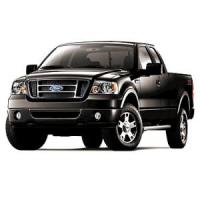The Canadian government of Prime Minister Stephen Harper is reported to be on the verge of giving $200 million from a “green initiatives fund” to Ford and General Motors – to help those failing companies continue to build really big (and increasingly unpopular) cars and trucks.
Ford, which lost $8.7 billion in the second-quarter of this year as its truck-dominated fleet crashed into oily reality, is advertising its latest Ontario production facility as “green” because it features a “more fuel-efficient V8 engine.” And Stephen Harper, in a pre-election vote-buying frenzy, is using taxpayers money to prop up this stupidity.
I would hope for some support from the libertarian community in criticizing this decision. As every Milton Friedman fan can attest, governments have a wretched record of picking industrial winners. And if you were trying to pick a winner in the current car wars, the names GM and Ford would not jump quickly to mind. The most an intelligent government investor might consider is a small subsidy for truly Canadian industry (Magna?) or for companies that are building small, energy-efficient and incredibly popular vehicles (Toyota, Honda).
But it defies belief that the Canadian Conservatives would divert “green” taxpayer cash to the construction of the largest regular-production engines on the continent – even if they are “more fuel-efficient.” That’s great, we can have “more fuel-efficient” F-150 trucks, the CAFE dodging behemoths that were once Ford’s best-selling vehicle.
It’s clear that the Tories would like to help (or be seen to be helping) the working folks of southern Ontario, who have been hit hard by Ford and GM‘s institutional incompetence. But subsidizing those companies at this juncture is analogous to buy an alcoholic cheap wine so he doesn’t have to drink vanilla extract.
This isn’t help; it’s enabling. And it couldn’t be more cynical, more wasteful or more pointedly destructive to the environment.
Subscribe to our newsletter
Stay up to date with DeSmog news and alerts






